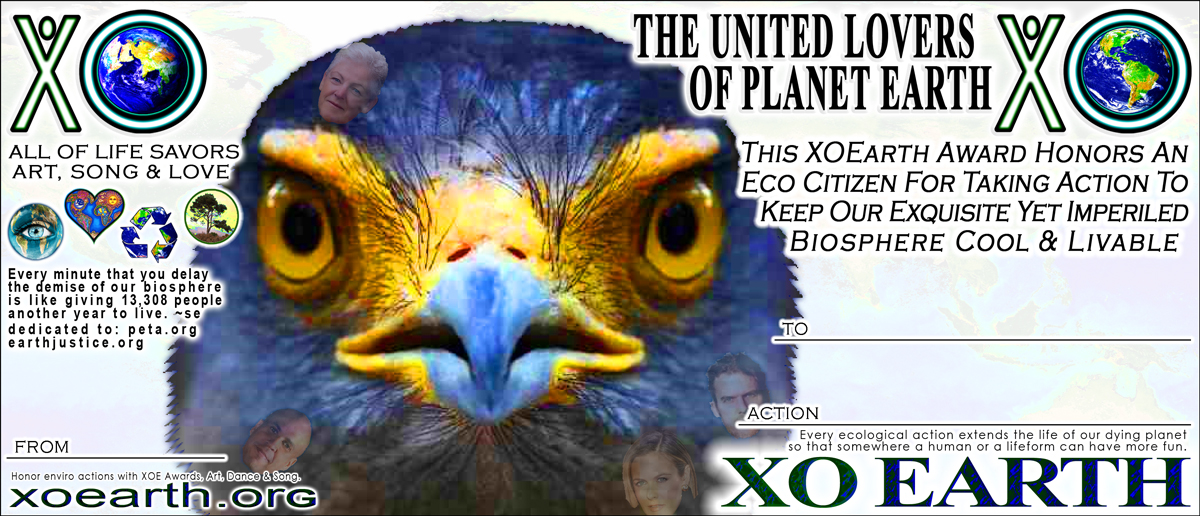

Give Bird XOEarth Awards to eco friends and others to thank them for their past or pledged environmental actions.
Lovers of our Earth’s biosphere are invited to copy and share, or print and give, these commemorative XOEarth Awards to your government officials, friends, businesses, customers, volunteers and employees to thank them for their environmental actions – either past or pledged.
These Bird XOEarth Awards have been dedicated to:
The Bird
EarthJustice – Using the power of law to defend our right to a healthy environment.
PETA – People For the Ethical Treatment of Animals
Alicia Silverstone – filmmaker, animal rights activist, environmental activist, speaker, writer
Gina McCarthy – environmental expert who was the 13th Administrator of the Environmental Protection Agency
Kip Anderson – film director of Cowspiracy and What The Health films
Cory Booker Senator (D) – 100% pro-environment and public health voting score of 100% for 2017 according to LCV.org
Bird
Reverse genetic engineering and the fossil record both demonstrate that birds are modern feathered dinosaurs, having evolved from earlier feathered dinosaurs within the theropod group, which are traditionally placed within the saurischian dinosaurs. Primitive bird-like dinosaurs that lie outside class Aves proper, in the broader group Avialae, have been found dating back to the mid-Jurassic period, around 170 million years ago.
Some birds, especially corvids and parrots, are among the most intelligent animals; several bird species make and use tools, and many social species pass on knowledge across generations, which is considered a form of culture.
The vast majority of bird species are socially monogamous (referring to social living arrangement, distinct from genetic monogamy), usually for one breeding season at a time, sometimes for years, but rarely for life.
A few species are able to use chemical defences against predators; some Procellariiformes can eject an unpleasant stomach oil against an aggressor,[100] and some species of pitohuis from New Guinea have a powerful neurotoxin in their skin and feathers.
The bird bill is used to brush away foreign particles and to apply waxy secretions from the uropygial gland; these secretions protect the feathers’ flexibility and act as an antimicrobial agent, inhibiting the growth of feather-degrading bacteria. This may be supplemented with the secretions of formic acid from ants, which birds receive through a behaviour known as anting, to remove feather parasites.
Bird calls and songs, which are produced in the syrinx, are the major means by which birds communicate with sound. This communication can be very complex; some species can operate the two sides of the syrinx independently, allowing the simultaneous production of two different songs.
Swifts are believed to be able to sleep in flight and radar observations suggest that they orient themselves to face the wind in their roosting flight. Some birds have also demonstrated the capacity to fall into slow-wave sleep one hemisphere of the brain at a time.
Female birds have sperm storage mechanisms that allow sperm from males to remain viable long after copulation, a hundred days in some species. Sperm from multiple males may compete through this mechanism.
Homosexual behaviour has been observed in males or females in numerous species of birds, including copulation, pair-bonding, and joint parenting of chicks.
The length and nature of parental care varies widely amongst different orders and species. At one extreme, parental care in megapodes ends at hatching; the newly hatched chick digs itself out of the nest mound without parental assistance and can fend for itself immediately. At the other extreme, many seabirds have extended periods of parental care, the longest being that of the great frigatebird, whose chicks take up to six months to fledge and are fed by the parents for up to an additional 14 months.
Excerpts via en.wikipedia.org/wiki/Bird [Wikipedia]
EarthJustice
In recognition of the EarthJustice‘s crucial litigations in the protection of our biosphere’s ecosystems that support human and other lifeforms on our planet, we are honored to dedicate these Bird XOEarth Awards to the LCV.org.
Earthjustice’s work is divided into three major program areas:
Health and Toxics – focuses on cases that they argue fight for healthy communities.
Climate and energy – focuses on cases that advance clean energy and promote policies that are argued will result in stable climate.
The Wild – focuses on cases that preserve wildlife and wild lands as defined by Earthjustice or their associates.
Earthjustice also partners with organizations from other regions, including Latin America, Russia, Japan, and China to promote the development of environmental law in their respective countries. Every year, Earthjustice submits a country-by-country report on Human Rights and the Environment to the United Nations.
Earthjustice has been a critical player in a number of important, precedent-setting cases regarding environmental protection in the United States.
For example, in the 1972 Supreme Court case Sierra Club v. Morton, Earthjustice (then known as the Sierra Club Legal Defense Fund) helped establish the right of citizens to sue for environmental damages. The case ultimately forced the Walt Disney Corporation to drop its plans to develop an enormous ski resort in the Mineral King valley in California’s Sierra Nevada Range. The lawsuit blocked any further development or private use of the land which has since been incorporated into the Sequoia National Park.
In the 2006 Supreme Court case, Massachusetts v. Environmental Protection Agency, Earthjustice attorneys helped a coalition of state governments and conservation groups force the U.S. Environmental Protection Agency (EPA) to fight global warming by limiting greenhouse gas emissions. It was the first Supreme Court case to ever address the issue of climate change.
Support EarthJustice at EarthJustice.org
PETA – People For the Ethical Treatment of Animals
In recognition of their superb animal welfare and animal defense work, and showing us the connection between the commercial animal factories [animal prisons] to climate change, we are honored to dedicate these Bird XOEarth Awards to the People For the Ethical Treatment of Animals [PETA].
PETA’s slogan is “Animals are not ours to eat, wear, experiment on, use for entertainment, or abuse in any other way.”
Founded in March 1980 by Newkirk and fellow animal rights activist Alex Pacheco, the organization first caught the public’s attention in the summer of 1981 during what became known as the Silver Spring monkeys case, a widely publicized dispute about experiments conducted on 17 macaque monkeys inside the Institute of Behavioral Research in Silver Spring, Maryland. The case lasted 10 years, involved the only police raid on an animal laboratory in the United States, triggered an amendment in 1985 to that country’s Animal Welfare Act, and established PETA as an internationally known organization. Today, it focuses on four core issues—opposition to factory farming, fur farming, animal testing, and the use of animals in entertainment. It also campaigns for a vegan lifestyle and against eating meat, fishing, the killing of animals regarded as pests, the keeping of chained backyard dogs, cock fighting, dog fighting, and bullfighting.
There has been criticism from feminists within the movement about the use of scantily clad women in PETA’s anti-fur campaigns and others, but as Norm Phelps notes, “Newkirk has been consistent in her response. No one, she says, is being exploited. Everyone … is an uncoerced volunteer. Sexual attraction is a fact of life, and if it can advance the animals’ cause, she makes no apologies for using it.” Also, Phelps notes that some activists believe that the group’s media stunts trivialize animal rights, but he qualifies this by saying, “[I]t’s hard to argue with success and PETA is far and away the most successful cutting-edge animal rights organization in the world.” Newkirk’s view is that PETA has a duty to be “press sluts.” She argues, “It is our obligation. We would be worthless if we were just polite and didn’t make any waves.”
The organization is known for its aggressive media campaigns, combined with a solid base of celebrity support—in addition to its honorary directors, Paul McCartney, Alicia Silverstone, Eva Mendes, Charlize Theron, Ellen DeGeneres, and many other notable celebrities have appeared in PETA ads. Every week, Newkirk holds what The New Yorker calls a “war council,” with two dozen of her top strategists gathered at a square table in the PETA conference room, with no suggestion considered too outrageous. PETA also gives an annual prize, called the Proggy Award (for “progress”), to individuals or organizations dedicated to animal welfare or who distinguish themselves through their efforts within the area of animal welfare.
PETA sends its staff undercover into research laboratories, factory farms, and circuses to document the treatment of animals. Investigators may spend many months as employees of a facility, making copies of documents and wearing hidden cameras. By 2007, it had conducted 75 such investigations. It has also produced videos based on material collected during ALF raids. Some undercover efforts have led to lawsuits or government action against companies and universities. PETA itself faced legal action in April 2007 after the owners of a chinchilla ranch in Michigan complained about an undercover inquiry there, but the judge ruled in PETA’s favor that undercover investigations can be legitimate.
Support People For the Ethical Treatment of Animals at PETA.org.
For all the life, Stele Ely
XOEarth Award Printing Tips
To print these awards, first go to your browser’s file menu and then to print preview. Decide which page you want to print. Set the margins to zero. Increase the custom size to between 100% to 107% depending on your browser. Then print.
In the print preview window, there should be 4 designs per page – on two or more pages. If you don’t see 4 designs per page, un-maximize the browser window and then adjust the width of the browser window so that it is about 1/3 the width of your full screen. The webpage should look narrow. Open the print preview window again. Then print.
For more printing tips see XOEarth.org/printing-tips.
There are two kinds of XOEarth Awards – Fast and Slow. Slow XOEarth Awards have a place to write the name of the person being honored, the eco action they have taken, and the name of the presenter. Fast XOEarth Awards don’t need to be filled out.
To see more XOEarth environmental awards that you can copy and share, or print and give to others for their eco actions, go to XOEarth.org/Awards.









Leave a Reply
You must be logged in to post a comment.